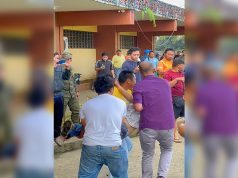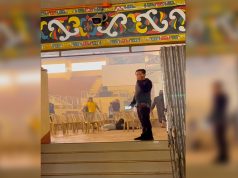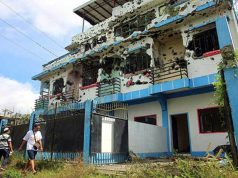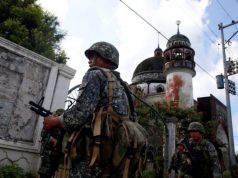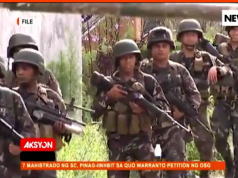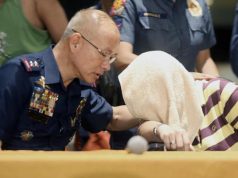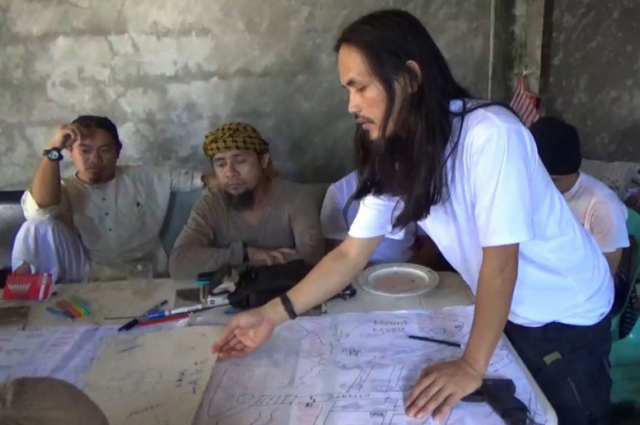
(UPDATE – 4:30 P.M.) MARAWI CITY – Local emissaries met on Sunday with a leader of a militant group loyal to Islamic State, officials said, taking advantage of a short truce in a battle over a southern city occupied by rebels for more than a month.
The eight Muslim leaders, referred to as imams, entered the conflict zone in the heart of Marawi City alongside rescue teams. It was not immediately clear what was discussed.
They reportedly met with the brothers Abdullah and Maddie Maute, who have earlier been speculated to have been killed in the fighting.
Part of the agenda of the emissaries was to persuade the terrorists to release the estimated 200 captive non-combatants who had been caught in the crossfire.
Retired General Dickson Hermoso, who coordinates efforts to free trapped civilians, said a unilateral eight-hour truce by the army to mark the Eid al-Fitr Islamic holiday was extended to enable the talks, details of which he withheld to avoid jeopardizing chances for dialogue.
“We need to balance this because this is very precarious,” Hermoso told reporters.
Col. Edgard Arevalo, Chief of the Armed Forces of the Philippines (AFP) Public Affairs Office, said the group went in “to help trapped civilians in the area. Its not AFP that initiated the meeting.”
The Maute group released some women and children on Sunday and the emissaries had come under fire briefly from rebel snipers.
“We have only established a foothold with the Maute,” Hermoso said. “We hope both sides will again grant us the respite.”
The military had indicated on Saturday that Abdullah Maute had fled from the town and was no longer in the fight even as there was no solid evidence of that, and authorities also believed his brother, Omarkhayam, was among three of the seven Maute brothers killed.
A source familiar with the meeting said the emissaries were from Marawi and were only granted access to Maute because they were of the same “Maranao” clan.
The seizure of Marawi has caused the biggest internal security crisis in decades for the Philippines, and a realization that the long-feared arrival of Islamic State could be a reality.
Images of black-clad fighters and Islamic State flags flying in Marawi has caused alarm in the mainly Roman Catholic nation, and the protracted occupation and presence of foreign fighters suggests the militants may have bigger designs on the southern Philippines than previously imagined.
The daily air strikes were halted on Sunday but small skirmishes took place as rebel snipers fired intermittently on positions held by troops.
Rescue teams tried to reach trapped civilians and recover bodies of dead residents killed in the heart of a city battered for weeks by clashes, air strikes and artillery shelling.
Prof. Antonio Custodio, a military historian, observed that prolonging the martial law situation could result in an incensed civilian population, an increasingly irrelevant civilian government from the point of view of the military, and lead to griping on the part of the soldiers: “You only use martial law to break the armed opposition in order to address [the situation]. In the ideal world, you use that so that the situation will not repeat. But if you extend it, you risk tiring the military, and the military does not want to get tired because, whenever the military gets tired, it starts griping.”
RESCUE AT GROUND ZERO
Military spokesman Jo-Ar Herrera said troops had not resumed operations after the truce and were holding defensive positions.
“We have reports there were around five people who came out from ground zero,” Herrera told news channel ANC.
“We’re very confident we can rescue more.”
Muslims attended prayers at a Marawi mosque in an emotional gathering.
The violence has displaced some 246,000 people, and killed more than 350, most of them rebels, and about 69 members of the security forces. Twenty-six civilians have been killed but officials believe many more could be dead.
“This is supposed to a day of happiness,” said Imam Aleem Ansari Abdul Malik, who led the prayers.
He reminded Muslims to shun the advances of radical groups.
“This is just a small fire, do not allow the flames to go bigger by joining extremists,” he said.
Conditions for those trapped in Marawi have been dire, with witnesses reporting bodies on streets, limited food and water and a constant threat of being killed by either the militants, or air strikes.
The threat of Islamic State gaining a foothold in the Philippines has been raised by their losses in Syria and Iraq, and intelligence reports that the militants are seeking new bases from which to project their agenda.
Though the military is confident it can retake Marawi soon, the level of the militants’ preparations, combat capability and resilience has created some trepidation about whether their assault could be the beginning of a wider campaign.
Lieutenant Colonel Emmanuel Garcia, head of the Western Mindanao civil-military operations, on Saturday said intelligence indicated that Malaysian operative and extremist fundraiser Mahmud Ahmad had been killed, while Isnilon Hapilon, the Islamic State anointed “emir” of Southeast Asia, had fled.
Click and watch the video report below:




